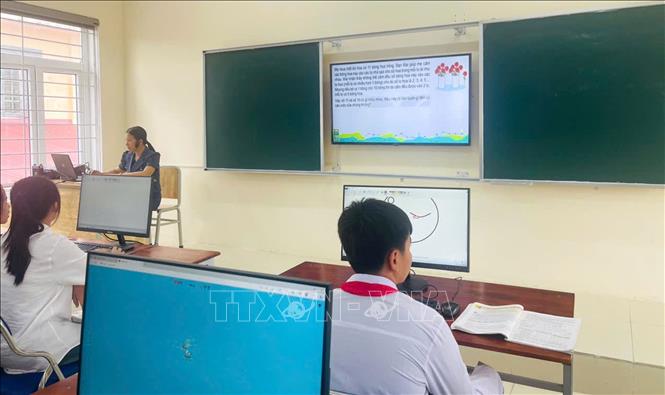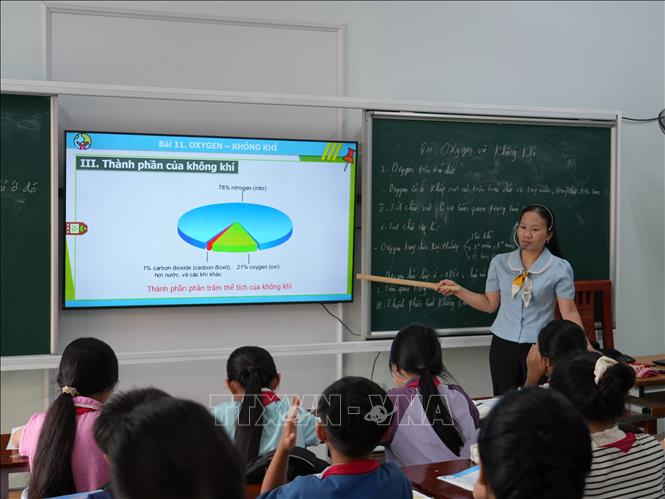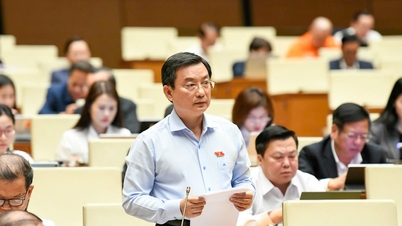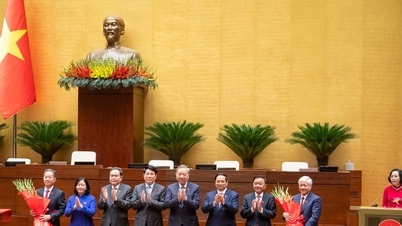Comprehensive, long-term program, worthy investment
Regarding the development of the National Target Program on modernization and improvement of the quality of education and training, Mr. Ta Viet Hung, Director of the Department of Education and Training of Bac Ninh province, said that this is a policy of strategic significance, demonstrating the Party's new vision in the period when the country enters a period of rapid and sustainable development on the basis of science - technology, innovation and comprehensive digital transformation.
According to Mr. Ta Viet Hung, this National Target Program creates mechanisms, resources and synchronous participation of the entire political system to make education and training truly become a "top national policy". This is not just a single investment project, but a comprehensive, long-term, interdisciplinary program to ensure that all people have access to quality, modern and equal education, from preschool to university, vocational education and lifelong learning.
The program will contribute to narrowing the quality gap between regions, promoting digital transformation in management, teaching, quality assessment, and at the same time creating breakthroughs in infrastructure, equipment, digital libraries, subject classrooms, teachers' housing, etc.
In the current context, the education sector must innovate more strongly than ever. The implementation of the 2018 General Education Program, the shift in the labor market, the demand for high-quality human resources in the era of artificial intelligence, green transformation and knowledge economy ... are posing great challenges. Without a national target program with comprehensive coverage and adequate resources, it will be difficult to ensure consistency between policy, investment and management, especially at the local level.
Therefore, the Director of the Department of Education and Training of Bac Ninh province hopes that when the program is issued and implemented, localities will have a legal basis and financial mechanism to mobilize diverse social resources, while increasing initiative in management and implementation.

Meritorious teacher Nguyen Van Ngai, former Deputy Director of the Department of Education and Training of Ho Chi Minh City, said that the Program needs to invest synchronously in the following areas: building facilities, equipping technological equipment, developing teaching staff, improving school management capacity, innovating teaching methods and organizing learning. At the same time, it is necessary to ensure fairness in access to education, avoiding large gaps between urban and rural areas, between favorable and difficult areas; schools in remote and isolated areas need to be prioritized.
The program also needs to put the development of learners' capacity at the center, helping students develop creative thinking, life skills and the ability to adapt to the digital environment; viewing students as "learning subjects" instead of just knowledge recipients.
Implementation requires clear governance and enforcement mechanisms, with a specific roadmap, transparent assessment criteria and clear assignment of responsibilities. In addition, it is necessary to mobilize social resources and strengthen international cooperation, taking advantage of the participation of businesses, international organizations and technology to improve education, contributing to regional and global integration.
Mr. Nguyen Van Ngai shared: Over the past years, despite many difficulties, the Vietnamese education sector has achieved remarkable achievements. The quality of general education has been improved, digital transformation and innovation in teaching methods and student assessment have made remarkable progress, which is an important premise for realizing the goal of modernizing education in the new period. The development and implementation of the National Target Program on modernization and comprehensive improvement of the quality of education and training this time is an action to concretize the spirit of Resolution 71-NQ/TW, at the same time continuing the precious tradition of the Party and State in considering education as the top national policy.
Focus resources on research and innovation universities
Dr. Le Duc Thuan, former Head of the Department of Education of Ba Dinh District, Hanoi, shared: The national target program to modernize and improve the quality of education and training is a policy to realize the goal of "Building a modern national education system, on par with the region and the world". It is not only an investment project, but also a strong political commitment, demonstrating the vision of bringing Vietnam to catch up with advanced countries through human resource development.
According to Dr. Le Duc Thuan, for the program to really make a difference, it needs to focus on priority groups.
Specifically, for general education, it is necessary to complete the goal of universalizing preschool education for children aged 3-5 by 2030 and implement 2 sessions/day of teaching. This is the most important physical and initial knowledge foundation. In addition, priority is given to developing foreign language skills, with the goal of "making English the second language in schools"; promoting STEAM education (Science, Engineering, Technology, Arts, Mathematics), scientific research and developing digital skills in general schools.
For higher education and vocational education, this is the place to train "high-quality human resources according to international standards", especially for key, emerging industries such as technology and smart management. Therefore, it is necessary to focus resources on building a number of higher education institutions into national centers of science, technology and innovation on par with advanced countries; develop vocational education to reach regional and world levels. In addition, priority is given to "promoting the development and application of artificial intelligence (AI) in education" and equipping workers with comprehensive digital skills.
Dr. Le Duc Thuan said that the development of the National Target Program is a solution to mobilize large resources from the state budget. In addition, breakthrough policy mechanisms are needed to effectively mobilize other resources to create a new driving force for the quality of human resources, helping the country realize its development aspirations.

Referring to the development of specific mechanisms and policies to implement Resolution No. 71-NQ/TW of the Politburo on breakthroughs in education and training development, Dr. Phan Dang Hai, Deputy Head of the Faculty of Law, Banking Academy, said: In the context of Vietnam's goal of becoming a developed, high-income country by 2045, university education does not stop at the function of training human resources. Universities must become intellectual resources, places that produce new knowledge, new technology and are bridges between science and production - business, between theory and practice. Therefore, Vietnam's selection and focus on investing in developing a number of higher education institutions into national centers of science, technology and innovation is a step forward from the model of "training university" to "research and innovation university", in line with global development trends.
The government needs to play a leading role in long-term strategic orientation and investment; concentrate resources on a number of elite universities instead of dispersing them too much; increase the proportion of budget investment for higher education; and establish university funds receiving sponsorship from businesses and alumni.
In addition, pilot other forms of resource mobilization to avoid complete dependence on the budget. Investment here is not only the budget, but also the mechanism for mobilizing social resources, businesses and international cooperation. Schools receiving investment must have a commitment to research quality, international publications, technology transfer and commercialization of scientific products.
In the long term, universities selected to develop into national science and innovation centers must aim to meet international standards in governance, research and technology transfer, participate in global academic cooperation networks, and have research products with Vietnamese brands recognized internationally.
Source: https://baotintuc.vn/giao-duc/chuong-trinh-muc-tieu-quoc-gia-nang-cao-chat-luong-giao-duc-20262035-20251111123452207.htm





![[Photo] Prime Minister Pham Minh Chinh chairs a meeting on housing policy and the real estate market.](https://vphoto.vietnam.vn/thumb/1200x675/vietnam/resource/IMAGE/2025/11/11/1762838719858_dsc-2107-jpg.webp)
![[Photo] Chu Noodles - the essence of rice and sunshine](https://vphoto.vietnam.vn/thumb/1200x675/vietnam/resource/IMAGE/2025/11/11/1762846220477_ndo_tl_7-jpg.webp)
































































































![Dong Nai OCOP transformation: [Article 4] Reaching national standard products](https://vphoto.vietnam.vn/thumb/402x226/vietnam/resource/IMAGE/2025/11/11/1762825820379_4702-cac-san-pham-trai-cay-chung-nhan-ocop-nongnghiep-174649.jpeg)


![Dong Nai OCOP transition: [Article 3] Linking tourism with OCOP product consumption](https://vphoto.vietnam.vn/thumb/402x226/vietnam/resource/IMAGE/2025/11/10/1762739199309_1324-2740-7_n-162543_981.jpeg)






Comment (0)